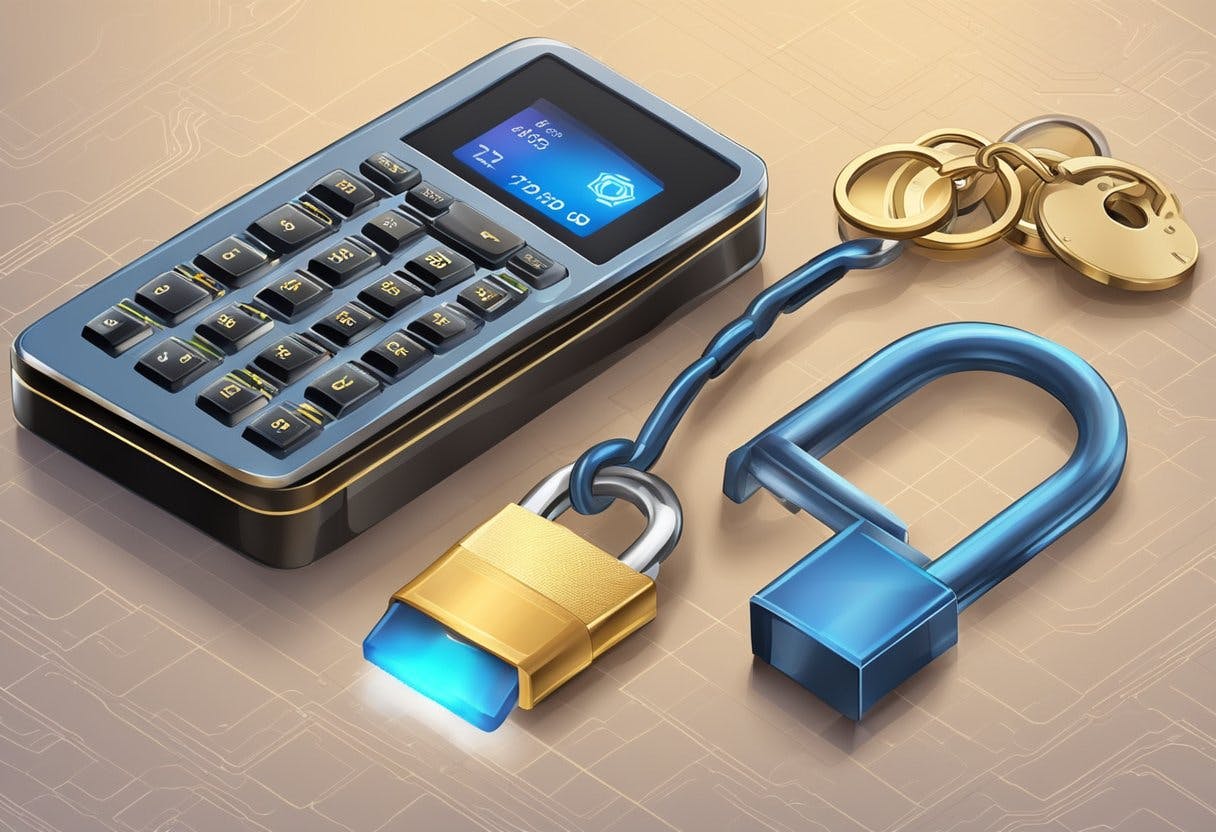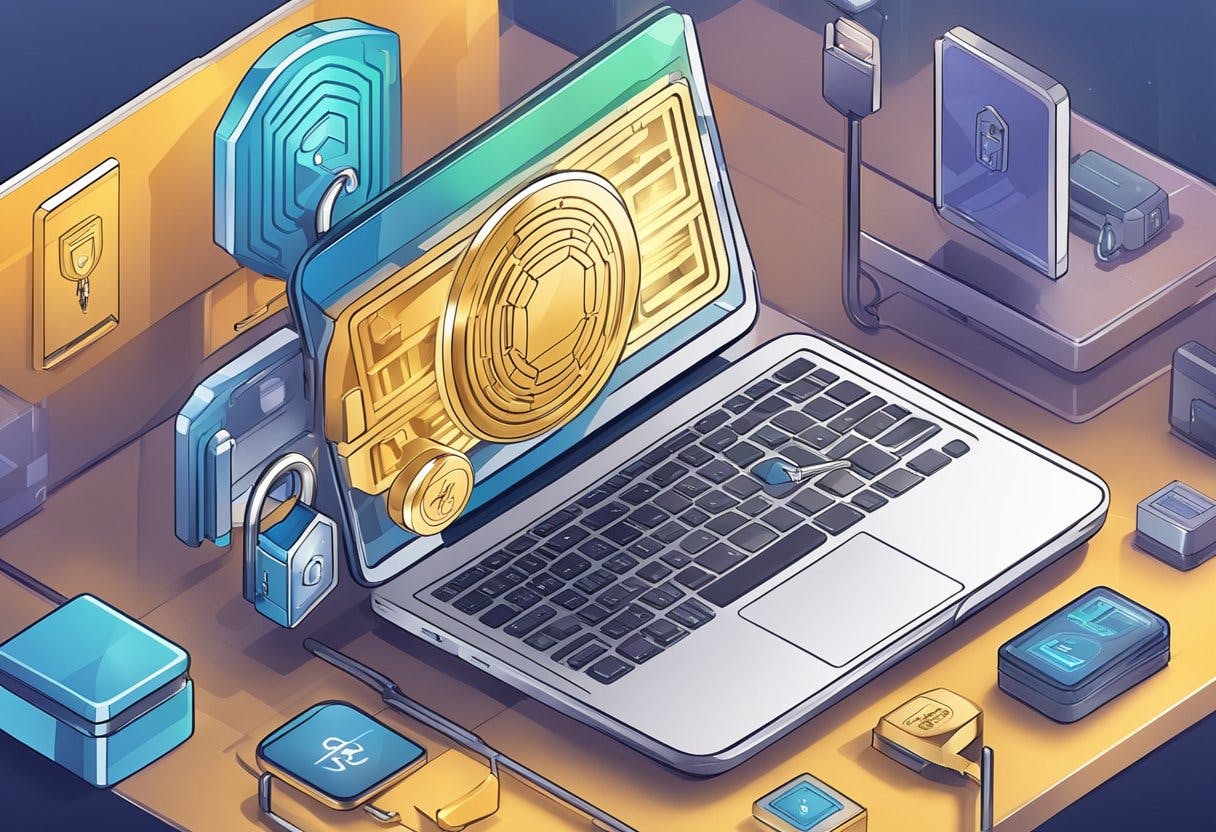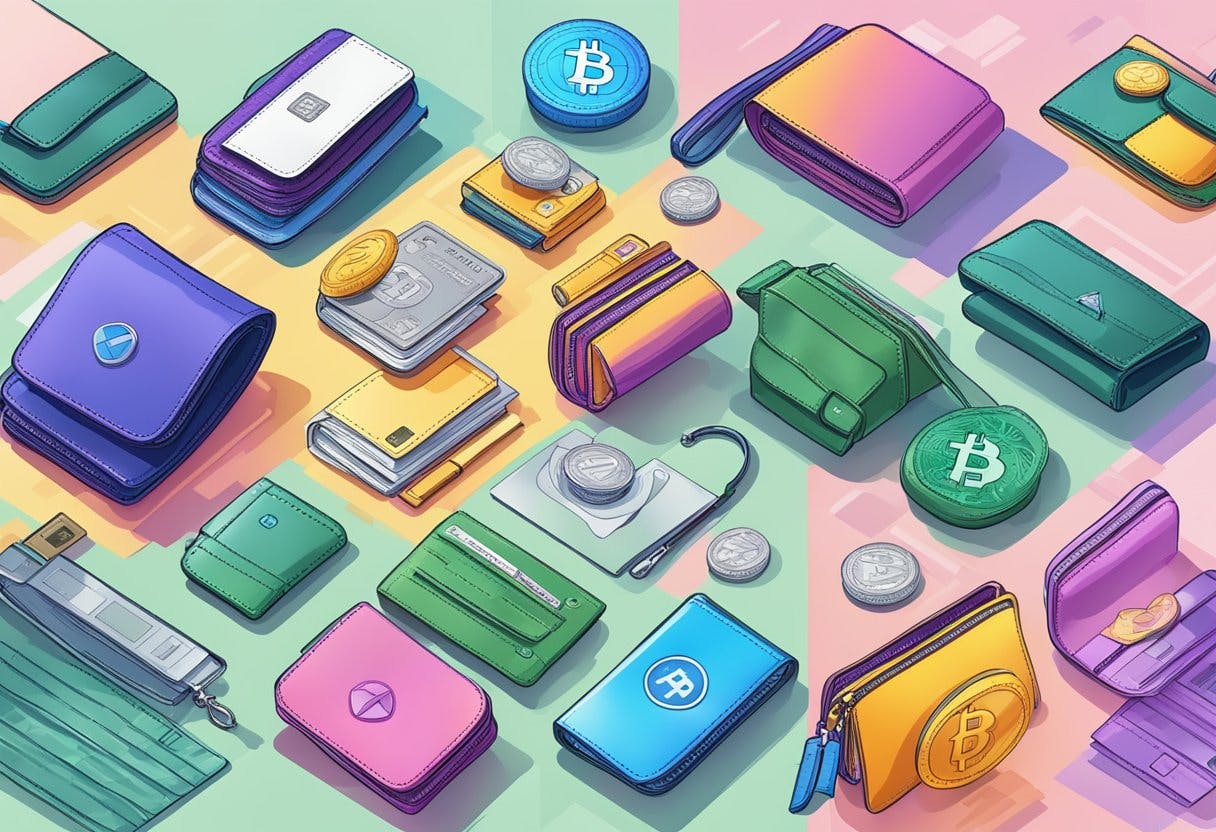
Cryptocurrency has become an increasingly popular investment option for many people. As the value of digital currencies continues to rise, it’s important to ensure that your cryptocurrency wallet is secure. With the rise of cybercrime and hacking, it’s essential to take steps to protect your digital assets. In this article, we’ll explore some of the best ways to secure your cryptocurrency wallet.

Understanding the different types of cryptocurrency wallets is the first step in securing your digital assets. There are several types of wallets available, including hardware wallets, software wallets, and paper wallets. Each type of wallet has its own unique features and benefits, and it’s important to choose the right one for your needs. Once you’ve chosen a wallet, you can take steps to secure it with strong access controls and by protecting your private keys and seed phrases.
Key Takeaways
- Understanding the different types of cryptocurrency wallets is essential for securing your digital assets.
- Strong access controls and protecting your private keys and seed phrases are key to securing your wallet.
- Recognizing and avoiding common security threats and implementing advanced security measures can further enhance your wallet’s security.
Understanding Cryptocurrency Wallet Types

Cryptocurrency wallets are digital tools that allow users to store, send, and receive digital assets securely. There are different types of cryptocurrency wallets, each with its unique features, advantages, and disadvantages.
Hot Wallets vs. Cold Wallets
Hot wallets and cold wallets are two broad categories of cryptocurrency wallets. Hot wallets are connected to the internet and are convenient for frequent transactions. However, they are more vulnerable to hacking and theft. Cold wallets, on the other hand, are offline and are considered more secure. However, they are less convenient for frequent transactions.
Hardware Wallets
Hardware wallets are physical devices that store private keys offline. They are considered the most secure type of cryptocurrency wallet. Hardware wallets are immune to malware and hacking attacks, making them ideal for long-term storage of large amounts of cryptocurrency.
Software Wallets
Software wallets are digital wallets that store private keys on a computer or mobile device. They are convenient for frequent transactions and are available as desktop, mobile, and web-based wallets. However, they are vulnerable to malware and hacking attacks, making them less secure than hardware wallets.
Online Wallets
Online wallets are web-based wallets that store private keys on a remote server. They are convenient for frequent transactions and can be accessed from anywhere with an internet connection. However, they are vulnerable to hacking attacks and are considered less secure than hardware and software wallets.
In conclusion, choosing the right type of cryptocurrency wallet depends on the user’s needs and preferences. Hardware wallets are the most secure, while hot wallets are the least secure. Software and online wallets are convenient for frequent transactions but are less secure than hardware wallets. It is essential to understand the different types of cryptocurrency wallets and their features to make an informed decision.
Securing Your Wallet with Strong Access Controls

When it comes to securing your cryptocurrency wallet, one of the most important things you can do is implement strong access controls. This means using strong passwords and enabling two-factor or multi-factor authentication (MFA) to prevent unauthorized access to your wallet.
The Importance of Strong Passwords
A strong password is one that is difficult for others to guess or crack. It should be at least 12 characters long, and include a mix of upper and lowercase letters, numbers, and symbols. Avoid using easily guessable information such as your name, birthdate, or common words. Instead, use a random combination of characters that you can remember or store in a password manager.
Two-Factor Authentication
Two-factor authentication (2FA) is an extra layer of security that requires you to provide two forms of identification to access your wallet. This typically involves entering a password and a unique code that is sent to your phone or generated by an app. By requiring both a password and a physical device, 2FA makes it much more difficult for hackers to gain access to your wallet.
Multi-Factor Authentication (MFA)
Multi-factor authentication (MFA) is similar to 2FA, but it requires more than two forms of identification. This might include a password, a unique code, and a biometric factor such as a fingerprint or facial recognition. While MFA can be more secure than 2FA, it can also be more cumbersome to use. However, it is worth considering if you have a large amount of cryptocurrency or if you are particularly concerned about security.
Overall, implementing strong access controls is an essential part of securing your cryptocurrency wallet. By using strong passwords and enabling 2FA or MFA, you can significantly reduce the risk of unauthorized access and protect your valuable assets.
Protecting Your Private Keys and Seed Phrases
When it comes to securing your cryptocurrency wallet, safeguarding your private keys and seed phrases is of utmost importance. In this section, we will discuss some of the best ways to protect your private keys and seed phrases from unauthorized access.
Encryption Techniques
Encryption is a powerful tool that can help protect your private keys and seed phrases from being stolen or compromised. By encrypting your wallet, you can ensure that only authorized users can access your funds. There are several encryption techniques available, such as AES-256, that can help secure your wallet. It is recommended to use a strong password to encrypt your wallet and avoid using common phrases or words.
Backup and Recovery Procedures
Backing up your wallet is crucial in case of device failure or loss. It is recommended to regularly backup your wallet onto an external hard drive or USB stick. You can also consider using a cloud-based backup service for additional security. It is important to ensure that your backup is stored in a secure location and is encrypted to prevent unauthorized access.
In addition to backing up your wallet, it is also important to have a recovery plan in place. This includes storing your seed phrase in a safe and secure location. You can also consider splitting your seed phrase into multiple parts and storing them in different locations for added security.
Safe Storage Solutions
Storing your private keys and seed phrases in a safe and secure location is crucial. You can use a hardware wallet, such as a Ledger or Trezor, to store your private keys offline. These wallets are designed to be tamper-proof and can help protect your funds from being stolen.
If you prefer to store your private keys and seed phrases digitally, it is important to use a secure password manager. This will help ensure that your passwords are stored securely and are not compromised. It is also recommended to use two-factor authentication to add an additional layer of security to your wallet.
In conclusion, protecting your private keys and seed phrases is essential to securing your cryptocurrency wallet. By using encryption techniques, backup and recovery procedures, and safe storage solutions, you can help ensure that your funds are protected from unauthorized access.
Recognizing and Avoiding Common Security Threats
When it comes to securing your cryptocurrency wallet, recognizing and avoiding common security threats is crucial. Here are some of the most common security threats and how to avoid them:
Phishing and Scams
Phishing attempts and scams are a common way for cybercriminals to steal cryptocurrency. These scams often involve fake websites, emails, or social media messages that appear to be from a legitimate source. Once the user enters their login credentials or private keys, the attacker can gain access to their funds.
To avoid falling victim to phishing scams, it is important to always verify the authenticity of any website, email, or message before entering any sensitive information. Users should also enable two-factor authentication (2FA) and avoid clicking on links or downloading attachments from unknown sources.
Public Wi-Fi and Network Security
Public Wi-Fi is often unsecured, making it an easy target for cybercriminals to intercept sensitive information. When using public Wi-Fi, it is important to avoid accessing your cryptocurrency wallet or any other sensitive accounts. Instead, use a virtual private network (VPN) or a mobile hotspot to securely access the internet.
In addition to public Wi-Fi, network security is also important. Users should ensure that their home network is secured with a strong password and updated firmware. They should also avoid using default login credentials for their router or modem.
Staying Informed About Latest Threats
Staying informed about the latest security threats is crucial for keeping your cryptocurrency wallet secure. Users should regularly read news and updates from reputable sources and follow best practices for securing their accounts.
In addition, users should keep their software and firmware updated to ensure that any known vulnerabilities are patched. They should also be wary of security breaches and cyberattacks, and take appropriate action if they suspect that their account has been compromised.
By following these best practices, users can minimize the risk of falling victim to common security threats and keep their cryptocurrency wallet secure.
Advanced Security Measures for Investors and Traders
Investors and traders who hold large amounts of cryptocurrency may want to consider advanced security measures to protect their digital assets. Here are some strategies to consider:
Using VPNs and Secure Internet Connections
Using a virtual private network (VPN) can help protect your online activity from prying eyes. A VPN encrypts your internet connection and masks your IP address, making it more difficult for hackers to intercept your data. When using a VPN, it’s important to choose a reputable provider that doesn’t log your activity or sell your data to third parties.
It’s also essential to use a secure internet connection when accessing your cryptocurrency wallet. Avoid using public Wi-Fi networks or unsecured connections, as these can leave you vulnerable to hacking and other cyber threats.
Regular Software and Wallet Updates
To stay ahead of security threats, it’s important to keep your cryptocurrency wallet software up to date. Developers often release updates that fix vulnerabilities and improve security, so it’s important to install these updates as soon as they become available.
In addition to updating your wallet software, it’s also important to keep your computer’s operating system and antivirus software up to date. This can help prevent malware and other types of cyber attacks that could compromise your digital assets.
Professional Security Services and Teams
For investors and traders who hold large amounts of cryptocurrency, it may be worth considering professional security services and teams. These services can provide advanced security measures such as multi-signature authentication, cold storage, and physical security measures to protect your digital assets.
When choosing a security service, it’s important to do your research and choose a reputable provider with a proven track record of protecting digital assets. It’s also important to consider the cost of these services, as they can be expensive and may not be necessary for all investors and traders.
By taking these advanced security measures, investors and traders can help protect their digital assets from cyber threats and ensure that their cryptocurrency wallets remain secure.
Frequently Asked Questions
How can I enhance the security of my cryptocurrency wallet?
There are several ways to enhance the security of your cryptocurrency wallet. Some of the best practices include using two-factor authentication, keeping your private keys offline, and regularly updating your antivirus software. Additionally, you should avoid sharing your wallet information with anyone and never leave your wallet open on a public computer.
What are the advantages of using a hardware wallet for cryptocurrency?
Hardware wallets are considered one of the safest ways to store cryptocurrency. They are physical devices that store your private keys offline, making it almost impossible for hackers to access your digital assets. Hardware wallets also allow you to make transactions securely, even on an infected computer.
What steps should I take to protect my cryptocurrency wallet from hacking?
To protect your cryptocurrency wallet from hacking, you should use strong passwords, enable two-factor authentication, and keep your private keys offline. You should also avoid clicking on suspicious links or downloading unknown software. In addition, you should regularly update your antivirus software and keep your operating system up-to-date.
Which security features are crucial for a secure crypto wallet app?
A secure crypto wallet app should have several security features, including two-factor authentication, biometric authentication, and encryption. It should also have a backup and recovery feature, allowing you to restore your wallet in case of loss or theft. Furthermore, a secure crypto wallet app should be regularly updated to fix any security vulnerabilities.
What practices should I follow to keep my digital assets safe in a cold wallet?
To keep your digital assets safe in a cold wallet, you should keep your private keys offline and store them in a secure location. You should also make sure that your cold wallet is not connected to the internet and is protected by a strong password. Additionally, you should regularly back up your wallet and keep your backup in a secure location.
How can I ensure my cryptocurrency transactions remain secure?
To ensure your cryptocurrency transactions remain secure, you should make sure that the website or platform you are using is legitimate. You should also double-check the address you are sending your digital assets to and make sure it is correct. Furthermore, you should avoid using public Wi-Fi when making transactions and always use a secure internet connection.
Read More




